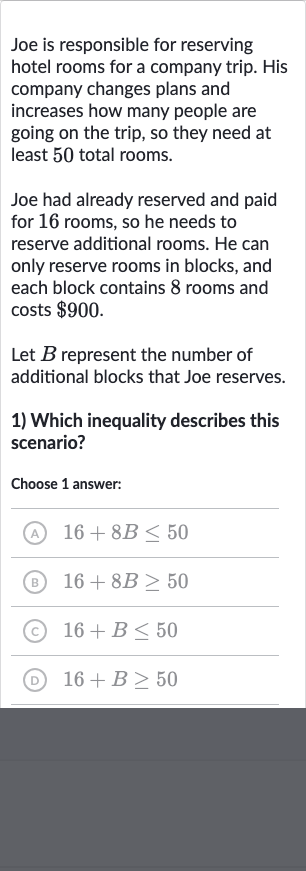AI tutor
Welcome to Bytelearn!
Let’s check out your problem:

Joe is responsible for reserving hotel rooms for a company trip. His company changes plans and increases how many people are going on the trip, so they need at least total rooms.Joe had already reserved and paid for rooms, so he needs to reserve additional rooms. He can only reserve rooms in blocks, and each block contains rooms and costs .Let represent the number of additional blocks that Joe reserves.Which inequality describes this scenario?Choose answer:(A) (B) (C) (D)
Full solution
Q. Joe is responsible for reserving hotel rooms for a company trip. His company changes plans and increases how many people are going on the trip, so they need at least total rooms.Joe had already reserved and paid for rooms, so he needs to reserve additional rooms. He can only reserve rooms in blocks, and each block contains rooms and costs .Let represent the number of additional blocks that Joe reserves.Which inequality describes this scenario?Choose answer:(A) (B) (C) (D)
- Initial Reservation: Joe initially reserved rooms. He needs at least rooms in total. Let represent the number of additional blocks of rooms that Joe reserves. To find out how many more rooms Joe needs, we subtract the number of rooms he has already reserved from the total number of rooms needed.Joe needs at least more rooms.
- Calculating Additional Rooms: Since each block contains rooms, we multiply the number of blocks, , by to find out the total number of additional rooms Joe reserves. represents the additional rooms Joe will get by reserving blocks.
- Total Number of Rooms: To express the total number of rooms Joe will have after reserving additional blocks, we add the initial rooms to the product of and .Total rooms =
- Inequality Representation: Joe needs at least rooms, so the total number of rooms after reserving blocks must be greater than or equal to . Therefore, the inequality that represents this situation is:
More problems from Solve multi-step inequalities
QuestionGet tutor help
QuestionGet tutor help
QuestionGet tutor help
QuestionGet tutor help
QuestionGet tutor help
QuestionGet tutor help
QuestionGet tutor help
QuestionGet tutor help
